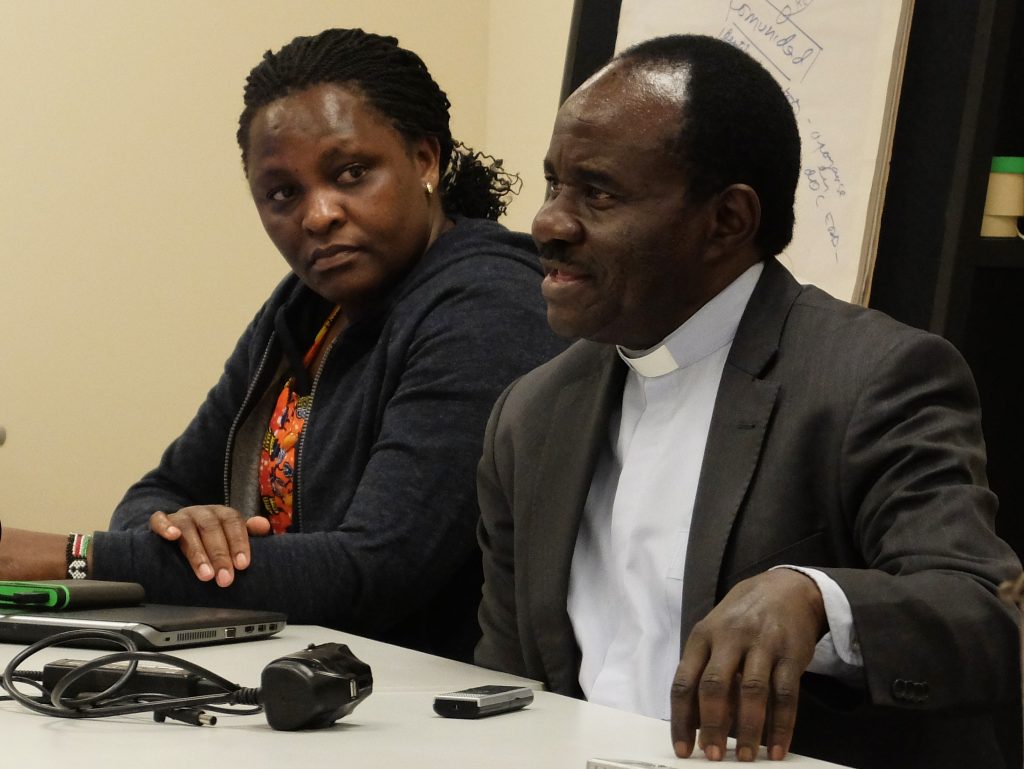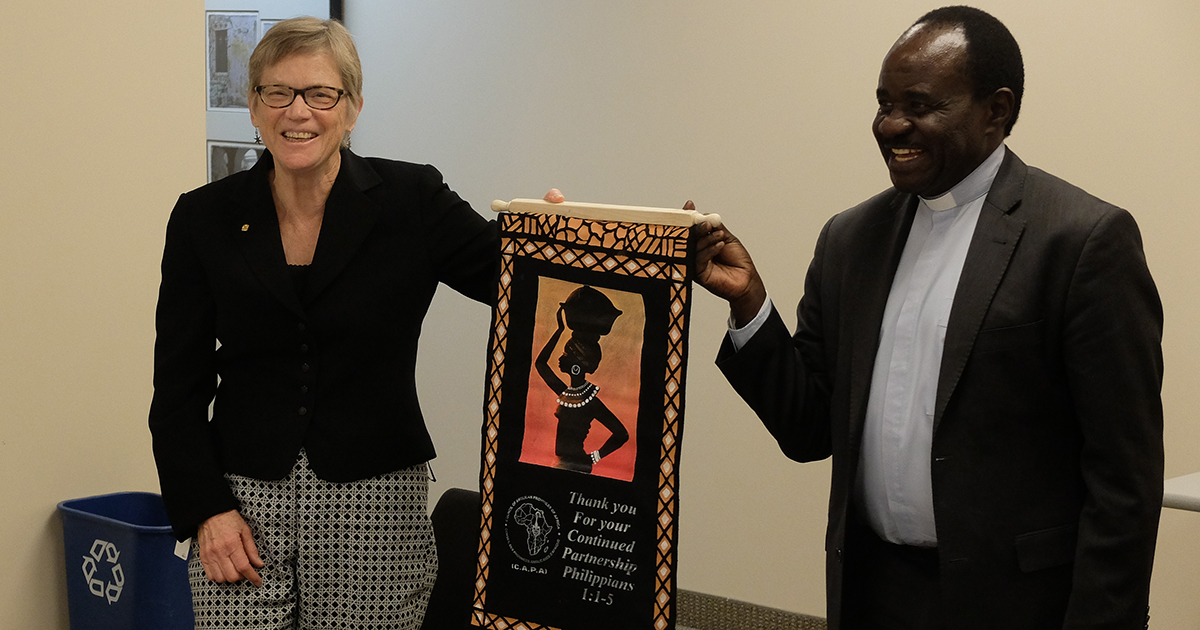Two representatives from the Council of Anglican Provinces of Africa (CAPA), general secretary Canon Grace Kaiso and communications and finance director Elizabeth Wanjiku Gichovi, spent the latter half of September on a multi-city tour meeting members of the Anglican Church of Canada. Their two-week trip took them to the dioceses of Niagara, Edmonton, Qu’appelle, Rupert’s Land, Ottawa, Montreal, and Toronto.
On Sept. 28, the pair visited the office of the General Synod to meet with the Primate and General Synod staff members, and to worship together with the Primate presiding and Canon Kaiso preaching. Both in his homily and at a subsequent “lunch-and-learn”, Kaiso said that meeting Anglicans across Canada had challenged many preconceived notions held by some Anglicans in Africa about the life of the Canadian church.
“The trip has been very informative,” Canon Kaiso said. “It has helped us to change a perception that is predominant in Africa that the church here [in Canada] is dying.
“We have experienced initiatives by the [Canadian] congregations and churches and dioceses that have sought to address and connect with the communities,” he said. “The beauty of this has been to see how the church has chosen to go out and meet where people are, not wait for them … We think that is a good approach.”

One of the ways Kaiso saw the Anglican Church of Canada carrying out its ministry was through partnerships between the church and government, such as dioceses working closely with municipalities to address issues such as housing and accommodation of refugees.
In many African nations, government corruption can make such partnerships more difficult, he reflected. The question of how to translate desired changes into public policy remains an ongoing struggle for Anglicans in Africa, who are grappling with social issues arising from urbanization and political instability.
“It is becoming very difficult to engage and to contribute to nation-building, because the processes that we would use, like parliament, is biased, is not serving the common good, is a tool for serving a regime instead of serving the well-being of the people,” Kaiso said.
“They are compromised, so this is generating a culture of violence,” he added. “How does the church respond to a culture of violence, and transform it into a culture of peace? Those are the areas of challenge that we are facing.”
‘The zeal for discipleship’
Kaiso praised what he called the “zeal for discipleship” among Canadian Anglicans, noting the use of the Alpha course by many congregations to deepen Christian fellowship and the growing numbers of parishioners volunteering in lay ministry.
“We were in Edmonton and the bishop was presiding over the commissioning of almost 70 lay ministers—lay readers, we call them—which is great, which means that people who have diverse skills will now be available to the church to connect it in different areas of need around the communities.”
Deepening the faith of Anglicans in their own communities is a major priority for the church in Africa, Kaiso said, suggesting that quantity of parishioners must be matched by the quality of Christian discipleship.
“Yes, we have large congregations, but are they healthy congregations?” he asked. Encouraging Bible study and working with members of their congregations, Kaiso said, aims to help them “become effective ambassadors of Christ wherever they are—in their places of work, wherever in their communities, so that they become agents of transformation inspired by gospel values.”
Reciprocal engagement
Another area where Kaiso found himself encouraged was in the response of the Anglican Church of Canada to injustices faced by Indigenous people in Canada..
He highlighted efforts to “model what it means to relate with those that have been aggrieved because of injustices, taking steps to seek forgiveness and creating avenues for the self-determination of the people of the First Nations”, and acknowledged that African nations similarly continue to deal with the legacy of colonization.
Detailing the work of CAPA during their presentation at Church House, Kaiso and Gichovi outlined various ongoing projects, such as mobilizing communities to provide milk coolers for farmers and supporting hydroponic farming to help mitigate the effects of climate change.
They also answered questions from General Synod staff members about the situation African churches face regarding Christian-Muslim relations, refugees in countries such as Uganda, the role of CAPA in establishing South Sudan as a new province of the Anglican Communion, and issues of gender justice.
Canon Isaac Kawuki Mukasa, Africa relations co-ordinator for the Anglican Church of Canada, who has visited CAPA several times along with Global Relations Director Andrea Mann, said the the trip by Kaiso and Gichovi provided a chance for reciprocal engagement between the Canadian and African churches.
“After spending time with these two … I’ve really come to a much greater appreciation of the scope of their responsibility, and just amazed by how many people they touch with their work,” Mukasa said.
Interested in keeping up-to-date on news, opinion, events and resources from the Anglican Church of Canada? Sign up for our email alerts .

